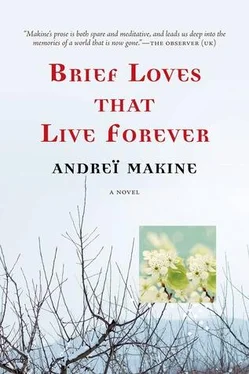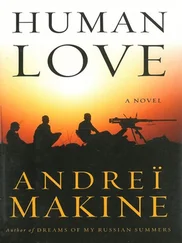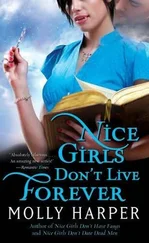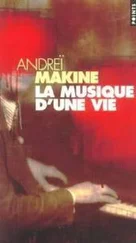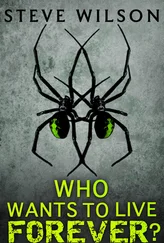There are two kinds of disabled people: those who make much of their problem, proclaim their handicap noisily, extorting obligatory compassion from us, and the self-effacing ones, who bear their cross in silence but who, if we come upon them privately, allow us to sense the aura of a constrained but rich existence, one that makes the lives of those of us in good health seem strangely impoverished.
From habit long since instinctive, Zhorka has sat down in a corner, so the disfigured half of his face remains hidden from passengers walking through the coach. He tilts his head toward his shoulder so that only his good eye can be seen. His injured foot with its enormous shoe is tucked under the seat. An unobservant glance would simply see a young man, a little on the squat side, chatting happily with a comrade.
“That drawing of Svetka? Yes, I remember. First the teacher made me erase it in front of the class. Then she gave me two hours’ detention. And she said I was ‘Picasso in his pink period.’ It’s true. I was blushing with shame!”
We laugh and I am no longer searching his face for old scars.
Gradually the amateur gardeners leave the train, the grid of fields gives way to forest. We get off at a stop where the dirt platform makes it look like a simple woodland clearing. The sun is already high, the air is as hot as in July, but in the thickets there is a chill that pricks our breathing with an icy bitterness.
Deep in the shadiest areas the last snowdrifts still lurk in hollows. The noise of the train dies away, we plunge into the mystery of this forest, barely tinged with green and therefore more silent than in summer, when the leaves on the trees all converse in their own languages. Zhorka knows the place well and I allow myself to be led, with the pleasant, childlike acceptance one feels in the company of a forest guide. We climb onto a mound covered in heather, skirt a damp valley, walk beside a little stream in which every stone, caught in a sunbeam, looks like a jewel. At first I try to continue our conversation but the words quickly run out, we no longer have any need to act like old school friends with a lot to say. Zhorka is in his element, the shade of the thickets, the last traces of snow rustling underfoot, silence. From time to time he crouches, carefully moves dead leaves aside, and unhurriedly cuts the stem of a morel. He lets me smell his first catch: a scent that strangely reminds me of a winter’s evening, a forgotten joy … I try to copy him, rummaging in the layer of pine needles, lifting fallen branches, but I find nothing. Strolling aimlessly through this forest on the brink of summer is happiness enough for me. The main thing is not to lose sight of Zhorka’s limping figure, not to trample on the tiny, pale flowers growing up through the rotting leaves here and there, not to breach the secret understanding that links me to this good fellow vanishing and reappearing among the trees.
The thoughts we share in our silent wanderings are vivid. I bring to mind our childhood not long after the war and the horrors we escaped. Our generation was able to turn the page, thrusting on toward the future in the round dance of youthful love affairs. Zhorka, for his part, did not have our luck. The past, like a snowdrift dormant in the undergrowth, made him stumble, he fell, was caught, dragged down by an era when dying was so commonplace. The injustice that struck him is repellent, unacceptable, and yet stupidly ordinary, like all the wretched accidents in our lives. If only he had waited thirty seconds longer, lying beside his comrades, the shell would have exploded and …
Ah, these “if onlys”! What devil or stroke of fate impelled him to stand up that day, go down to the fire, and stir the embers? I could have held him back by grabbing his sleeve or tripping him up, or gone myself to the shell baking in the fire. In the latter case it would now have been me hobbling along, disfigured, through these springtime thickets …
He must have turned such ideas over in his head a thousand times since that day. Asking himself: “Why me? What am I being punished for?” The years passed and he grew accustomed to putting up with himself as he now was, the questions remained unanswered.
I also bring to mind that moment frozen in time: a boy’s body suspended amid a cascade of earth thrown up by the explosion. A static liftoff that our terrified eyes cut out and photographed for all time. The moment when fate must have pondered whether it would not be better to kill this child rather than granting him life as a cripple. For Zhorka this toss-up was to become a haunting theme that only suicide could have laid to rest. Was it a step he ever considered?
Is he considering it now, as he walks along slowly here in this forest, crouching, caressing the layer of dead leaves? At intervals he turns, smiles at me, always with his head tilted on one side. What can he expect from this life? A woman’s gentleness, a love affair? Surely not. It is as if his body had been crushed with particular care so as to eliminate the least chance of such an encounter, a tender relationship. So what remains for him? He will sell these morels, buy a bottle of cheap wine, and, overcome with drink, dream. But of what? Of whom?
The image of Zhorka alone, drunk, is so intolerable to me that I fall back on a glimmer of hope, a happy outcome such as we always conjure up for social outcasts: this disabled man and a young woman, herself a cripple, a little human warmth, a soul mate who might …
I catch myself hoping for this with rare fervor, as if it were a wish I would like to see granted whatever the cost. All at once I feel bereft of my acrobat-lover’s self-assurance, prepared to renounce some part of my own happiness, so that their humble happiness might be possible. I could, for example, accept an end to my own affair, a period of loneliness, separation from the woman I had accompanied to the bus station that morning …
The feeling is sincere, almost a prayer, it makes me realize that something essential is lacking from the freewheeling frivolity of my life.
I snap out of it and shake off these solemn thoughts, picture my girlfriend’s return this evening, being reunited with her, the carefree hunger of desire, a night spent making love, laughing, delighting in juggling with words, caresses, plans for a summer that will soon be here … The prospect of this takes me further still from the purpose of our mushroom hunt, I smile: my setting off at the drop of a hat to meander through a damp wood in the company of a hunchback who looks like a character from a fairy tale is all of a piece with my casual lifestyle. The real charm of it, indeed, is being able to flit like a butterfly from one possibility to another, each one a little anarchic, a little ludicrous. I walk on, relax, no longer thinking about Zhorka …
I locate him from the snapping of a branch at the edge of an aspen spinney. His lame leg has caught on a root. Fallen to his knees, he gets up with tangled clumsiness. I am distressed to see how awkward his disability makes him: it costs him an effort, pushing against the ground with both hands, to stand up …
“We won’t go any farther,” he tells me, showing me a field beyond which the blue glow of a fine ancient forest can be seen, with temptingly majestic trees. “Those fields were mined during the war. There’s no knowing what might still be hidden there …”
His voice is dull, marked by anger held in check, which quickly exhausts itself in weariness.
“There are so many of those damned things still buried …”
“But what about your morels? You’ve not found many, have you?”
I laugh to distract him from the vision of that field where death lurks.
He shakes his basket gently, the mushrooms in it are covered by fern fronds, it is only half full.
Читать дальше
